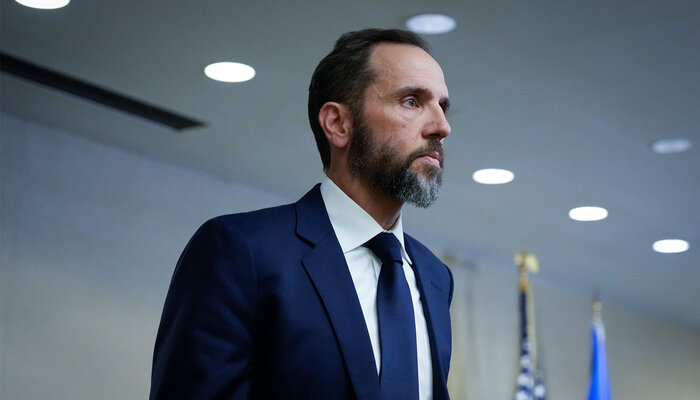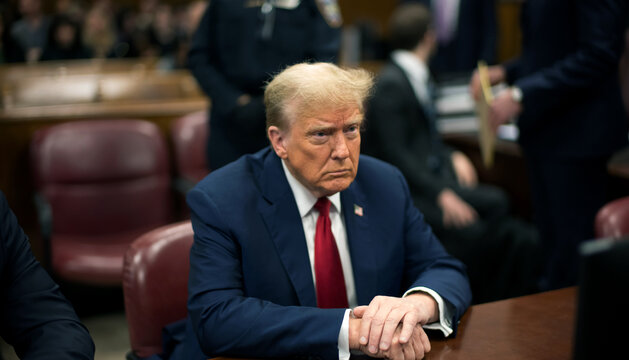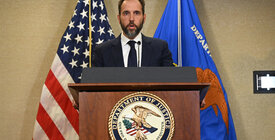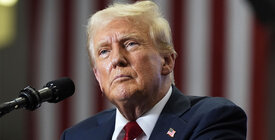
Jack Smith’s New Filing Against Trump Is Proof of Process, Not Politics
The special counsel has done nothing but comply with the reasonable rules set by the judge.

Part of
Special Counsel Jack Smith’s Washington, DC, prosecution of Donald Trump for attempting to overturn his 2020 election loss is back. After months of waiting for the Supreme Court to rule on Trump’s presidential immunity argument, then weeks of grappling with the fallout from the shocking decision granting former presidents broad protection from criminal prosecution for “official acts,” Smith’s opening move was to return to the grand jury for a superseding indictment at the end of August. The new charges removed all references to Trump’s interactions with Justice Department personnel — actions that the Supreme Court explicitly said fell within the scope of core presidential immunity, meaning Trump could not be charged for them.
Judge Tanya Chutkan set a briefing schedule, and on September 26, Smith filed his opening brief on the question of whether any of the charges in the superseding indictment or the evidence he wanted to use to prove them were barred by the Supreme Court’s new rules for presidential immunity. Smith argued none of it was out of bounds. When the brief was unsealed a week later, Trump took to social media to accuse the special counsel of foul play, alleging that Smith had strategically timed the brief to sway voters in the lead-up to the election. Trump called it “election interference,” and he will likely continue to do so as he objects to Judge Chutkan’s latest decision to also unseal the appendices Smith attached to his brief.
But Trump’s claims lack any merit. Judge Chutkan heard the parties’ arguments and established the order of the briefs so she could efficiently develop the detailed factual record the Supreme Court ordered her to compile. Trump had already filed his motion to dismiss the case based on presidential immunity. That motion was the subject of the appeal to the Supreme Court. On remand, it made sense for Smith to lay out his arguments first so Trump could respond to them. And Trump offered no justification for additional delay. With Judge Chutkan’s jurisdiction restored after the Supreme Court issued its mandate, it was time to get back to work.
Smith’s position is that most of the indictment is about unofficial conduct. It is about candidate Trump, not President Trump. If Judge Chutkan agrees, Smith will be able to go forward with this portion of his case, because the Supreme Court held that personal conduct is not protected by immunity.
Smith took a different tack when it came to the charges involving Vice President Mike Pence. He argued that although communications between Trump and Pence were official conduct, they were not the type of core conduct that the Court held was always immune. Instead, he argued that they fell within the category of “other” official conduct that is only presumed to be immune. However, that presumption can be overcome if the government shows that prosecution will not impair the functioning of the presidency. Smith argued it will not in this case. Indeed, a failure to prosecute a president who tries to hold on to power by corrupting his vice president into a conspiracy would seem to damage the presidency far more than permitting such a prosecution to proceed.
Now that Smith has made clear his position that everything in the superseding indictment is fair game, it will be up to Trump’s team to persuade the judge that any of the charges or evidence run afoul of presidential immunity. You might expect that Trump would be eager to explain why Smith’s arguments are in error, but that is not the case. Instead, his lawyers asked Judge Chutkan to push the due date for their response, originally slated for October, to November 21. They asked for permission to file an additional response, known as a sur-reply, on December 19. (Trump, as the party moving to dismiss, is entitled to have the last word here.)
Judge Chutkan ultimately gave Trump’s team some, but not all, of the additional time they asked for, making their response due on November 7, just after the election. Smith’s reply is due on November 21. Trump’s sur-reply, the final brief in the sequence, is due on December 5. The issue will be ripe for Judge Chutkan to decide at this point unless she decides oral argument or testimony is necessary.
An irregular briefing sequence
Usually, when a defendant files a motion to dismiss, they file the first brief. Although that’s the typical path, in this case, the government asked to go first, and Judge Chutkan decided there were good reasons to allow it. That irregular procedure became a focal point for complaints by Trump and his team. But trial judges have broad discretion to conduct their cases, and given that Trump still gets to file the final brief, there is no conceivable prejudice.
The Supreme Court returned the case to Judge Chutkan with directions to develop a full factual record and make rulings on immunity. Her decisions will be subject to another round of appellate review before the case can proceed to trial. Judge Chutkan favored the efficiency of having Trump respond to Smith’s arguments. Had Trump gone first, he would have simply been guessing at Smith’s position. And the government had made it clear that it preferred to deal with all the immunity arguments in one fell swoop so there would only be one more round of appeals, not a piecemeal, endless process.
Trump also complained that the judge permitted Smith to file a significantly longer brief than the rules usually allow. That argument is uncompelling. The thorough factual record the Supreme Court required means that Smith must methodically cover all the charges in the case and the evidence he will use to prove them. Had he been less thorough, Trump would likely have strenuously objected to the inclusion of anything he did not set forth at this stage. The Supreme Court set Judge Chutkan a task, and both she and Smith are doing their best to comply. The judge gave Trump the same number of pages for his response, 180, that she authorized Smith to use in his brief.
The judge is trying to do what the Court directed her to do in the most efficient manner possible. That may be contrary to Trump’s desire to delay the case ad infinitum, but there’s no substantive flaw in the process Judge Chutkan is using. In fact, most defendants would be delighted to have the prosecution’s entire case laid out for them, as Smith did for Trump in his brief, along with ample space to respond.
Allegations of election interference
Instead, Trump is calling the special counsel’s brief election interference, accusing Smith of trying to influence voters by laying out the evidence and charges in the case as the Supreme Court directed. This doesn’t make a lot of sense. Americans watched Trump’s efforts to interfere with the outcome of the election unfold, and Trump has frequently commented on them himself. While there may be more specifics in Smith’s brief, the basics are well known, and Trump possesses a big public megaphone that he has not hesitated to use to respond to the allegations against him and accuse the special counsel of misconduct.
The Justice Department has an internal policy, a so-called 60-day rule, that is an unwritten requirement that prosecutors avoid taking steps that could affect an election. The rule is understood to prevent a surprise indictment, search warrant, or public statement shortly before an election if avoidable. In situations like those, the public might assume the worst and convict a candidate on the basis of speculation and gossip, costing them the election before they had their day in court. Here, Smith filed a brief in response to a date ordered by the court. That alone removes it from the type of conduct the rule is intended to address — voluntary actions taken by prosecutors. But beyond that, the contours of Trump’s conduct are already well known, and new details are highly unlikely to influence the election. The House January 6 committee presented testimony about them, and Trump has relitigated them in rally after rally and frequent social media posts.
It’s ludicrous to suggest that Smith timed his brief, which followed a lengthy appellate delay he did not control, to interfere with the election. If so, Smith chose a poor vehicle, as a 165-page brief full of dense legal argumentation is not exactly meant for mass public consumption. In any event, it wasn’t his call. The Supreme Court sent the case back to Judge Chutkan with orders for her to proceed and no indication that it contemplated a pre-election delay. Trump’s complaints about the process are just another manifestation of his familiar legal strategy: delay.
The judge must now determine what, if any, charges and evidence are barred by presidential immunity before the case can proceed. Trump’s complaint about how she’s doing that comes down to this: it is designed to move the case forward. That’s the real objection; his team does not want the case to progress. They’re complaining that Trump will have to face justice at the hands of a judge and a jury, and they’re trying to prevent that from happening. But that’s not a legitimate complaint. No defendant is entitled to put off his trial indefinitely simply because he wants to. As former acting Attorney General Sally Yates said in a 2016 speech, “Our job is to seek justice — to seek justice in each and every case.” That remains true even when Donald Trump is the defendant.
More from the Trump Trials collection
-
What’s Ahead for Jack Smith
A former U.S. attorney breaks down the challenges and choices the special counsel now faces in prosecuting Trump. -
What Could Happen in Trump’s Florida Classified Documents Case?
The decision of whether to prosecute the former president for mishandling national security secrets will likely end up in the Supreme Court’s hands. -
The Supreme Court Gives the President the Power of a King
The immunity decision has enormous implications for Trump’s trial — and the future of the presidency.




